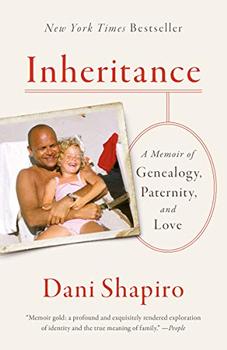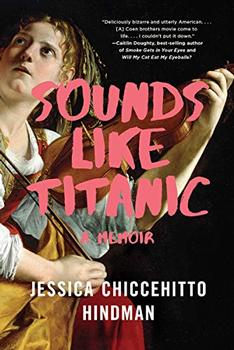Summary | Excerpt | Reading Guide | Reviews | Beyond the book | Read-Alikes | Genres & Themes | Author Bio

A Memoir of Genealogy, Paternity, and Love
by Dani ShapiroDani Shapiro's Inheritance begins with a shocking discovery. In the opening chapters Shapiro recounts how in early 2016, after submitting her DNA for analysis through Ancestry.com on a whim (See Beyond the Book), she found out that she is not in fact biologically-related to her deceased father, an Ashkenazi Jew. The test results understandably unsettled the acclaimed memoirist, who has spent her career writing about family history and Jewish culture. Shapiro cogently conveys the turmoil she felt upon learning that she is only 52% Jewish and unrelated to her dad, and then the main storyline of Inheritance begins in earnest as she attempts to track down her biological father and reckon with what her finding means for her sense of herself as a proud Jewish woman.
Over the course of the memoir's first half, Shapiro details the steps she took to unravel her genealogical mystery in clear-cut, precise prose. Remarkably, her journey to find her biological father is not marked by frustration and pain as it is for many, but rather a surreal, almost unbelievable ease. The memory of a single conversation she had years ago with her deceased mother led Shapiro down a rabbit hole: her conception, her mother once told her, involved "a doctor—an institute—in Philadelphia." Shapiro describes how in mere months, using only those cryptic clues, she managed to find out that her parents used a sperm donor for her conception at a cutting-edge institute in Philadelphia back in the 1960s, making them one of the first infertile couples to risk the then-experimental procedure. More spectacularly, she even managed to learn the donor's name and contact information, an achievement that usually takes years.
The first half of the book, while interesting, is a bit repetitive. Shapiro alternates between painting vivid portraits of her parents, recollecting the history of artificial insemination in America, and, most often, considering what her discovery means for her sense of self. Despite speaking flawless Hebrew and being raised as Orthodox, the blonde-haired and blue-eyed Shapiro has never "looked the part" of a Jewish woman, "to such a degree that it became a defining aspect of [her] identity" and a point of insecurity early in her life. She spends most of the first two sections of her four-part memoir questioning whether or not her newly discovered ancestry makes her less Jewish. The author's anxiety is understandable, but her excessive worrying becomes monotonous. Thankfully, these chapters, like the rest, move at a fast pace, and the memoir's second half is more consistently engaging.
In the third and fourth parts, Shapiro shifts to narrating the thrilling tale of her attempt to contact and establish a relationship with her biological father, a renowned doctor living in Portland with his family. Here, Shapiro reflects on the visceral feeling of connection she experienced after studying videos of the man online and combing through his website, noting the similarities in their physical appearance, traits and mannerisms. An expert at storytelling, the author keeps readers in suspense as she reveals her story piecemeal, all the while asking, "What did I owe him? What did he owe me? Who were we to each other?"
Shapiro explores the ethical and existential questions at the heart of her journey with sensitivity and nuance. She occasionally belabors her points, but rarely do her musings about identity and ancestry read as simplistic or shallow. A complex and multifaceted memoir, interwoven with history and full of feeling, Inheritance is sure to appeal to loyal fans of the author as well as readers new to her thoughtful work.
![]() This review was originally published in The BookBrowse Review in January 2019, and has been updated for the
February 2020 edition.
Click here to go to this issue.
This review was originally published in The BookBrowse Review in January 2019, and has been updated for the
February 2020 edition.
Click here to go to this issue.

If you liked Inheritance, try these:

by Libby Copeland
Published 2021
A deeply reported look at the rise of home genetic testing and the seismic shock it has had on individual lives.

by Jessica Chiccehitto Hindman
Published 2020
A Finalist for the 2019 National Book Critics Circle Award in Autobiography
"Deliciously bizarre and utterly American.…[A] Coen brothers movie come to life.…I couldn't put it down." —Caitlin Doughty, best-selling author of Smoke Gets in Your Eyes and Will My Cat Eat My Eyeballs?
The only real blind person at Christmas-time is he who has not Christmas in his heart.
Click Here to find out who said this, as well as discovering other famous literary quotes!
Your guide toexceptional books
BookBrowse seeks out and recommends the best in contemporary fiction and nonfiction—books that not only engage and entertain but also deepen our understanding of ourselves and the world around us.